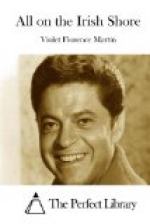Facing him, the plaintiff lounged against the partition; a man strangely improbable in appearance, with close-cropped grey hair, a young, fresh-coloured face, a bristling orange moustache, and a big, blunt nose. One could have believed him a soldier, a German, anything but what he was, a peasant from the furthest shores of Western Ireland, cut off from what we call civilisation by his ignorance of any language save his own ancient speech, wherein the ideas of to-day stand out in English words like telegraph posts in a Connemara moorland.
Between the two stood the interpreter—small, old, froglike in profile, full of the dignity of the Government official.
“Well, we should be getting on now,” remarked the Chairman, Heraty, J.P., after some explanatory politeness to his unexpected visitors. “William, swear the plaintiff!”
The oath was administered in Irish, and the orange moustache brushed the greasy Testament. The space above the dado of the partition became suddenly a tapestry of attentive faces, clear-eyed, all-comprehending.
[Illustration: SWEENY.]
“This case,” announced Mr. Heraty judicially yet not without a glance at the visitors, “is a demand for compensation in the matter of a sheep that was drowned. William”—this to the interpreter—“ask Darcy what he has to say for himself?”
Darcy hitched himself round, still with a shoulder propped against the partition, and uttered, without any enthusiasm, a few nasal and guttural sentences.
“He says, yer worship,” said William, with unctuous propriety, “that Sweeny’s gorsoons were ever and always hunting his sheep, and settin’ on their dog to hunt her, and that last week they dhrove her into the lake and dhrownded her altogether.”
“Now,” said Mr. Heraty, in a conversational tone, “William, when ye employ the word ‘gorsoon,’ do ye mean children of the male or female sex?”
“Well, yer worship,” replied William, who, it may incidentally be mentioned, was himself in need of either an interpreter or of a new and complete set of teeth, “I should considher he meant ayther the one or the other.”
“They’re usually one or the other,” said Doctor Lyden solemnly, and in a stupendous brogue. It was the first time he had spoken; he leaned back, with his hands in his pockets, and surveyed with quiet but very bright eyes the instant grin that illumined the faces of the tapestry.
“Sure William himself is no bad judge of gorsoons,” said Mr. Heraty. “Hadn’t he a christening in his own house three weeks ago?”
At this excursion into the family affairs of the interpreter the grin broke into a roar.
“See now, we’ll ask Mr. Byrne, the schoolmaster,” went on Mr. Heraty with owl-like gravity. “Isn’t that Mr. Byrne that I see back there in the coort? Come forward, Mr. Byrne!”
Thus adjured, a tall, spectacled man emerged from the crowd, and, beaming with a pleasing elderly bashfulness through his spectacles, gave it as his opinion that though gorsoon was a term usually applied to the male child, it was equally applicable to the female. “But, indeed,” he concluded, “the Bench has as good Irish as I have myself, and better.”




